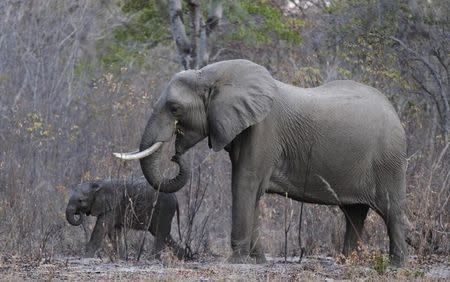Sudanese poachers kill elephants amid Central Africa chaos: UN experts

By Louis Charbonneau UNITED NATIONS (Reuters) - Sudanese poachers have been taking advantage of the chaos in conflict-torn Central African Republic and are killing elephants for their ivory and other wild animals, an expert panel that monitors U.N. sanctions said in a confidential report seen by Reuters. Central African Republic (CAR) descended into chaos in March 2013 when predominantly Muslim Seleka rebels seized power, triggering reprisals by "anti-balaka" Christian militias who drove tens of thousands of Muslims from the south in a de facto partition of the landlocked country. Although rival armed groups agreed to a peace accord in May, the conflict has continued at a lower intensity, and a transitional government has been unable to assert its authority over CAR's vast, mineral-rich territory. One of the main problems is trafficking in "blood diamonds." In May two groups of some 200 poachers from Sudan were active in eastern CAR, killing elephants and other wild animals, according to the report. "They usually establish a base camp from where they split into smaller groups of 20 to 30 poachers," the panel said. "The drastic decrease in the pachyderm population – approximately 400 savannah elephants remain in eastern CAR – is obliging poachers to remain longer in the CAR than before, including during the rainy season," it added. The panel said the Sudanese poachers were experienced, well-armed with AK-47 assault rifles, and feared. There were also instances in which the poachers have attacked members of the Lord's Resistance Army (LRA), a rebel group that rose up against the Ugandan government in the 1980s and is active in CAR. The experts said the poachers assumed that the LRA "always transports elephant tusks, gold and other valuables." "Even though poachers are reported to have robbed and regularly harassed civilians, no killings or acts of sexual violence have been reported," the report said, adding that the poachers likely wanted to avoid drawing attention of an African Union military force seeking to neutralize the feared LRA. Sudan's U.N. mission did not respond immediately to a request for comment. The experts said the LRA "remains one of the main threats to peace and security in the east and southeast of the Central African Republic, in particular in the provinces ... bordering Sudan, South Sudan and (Democratic Republic of the Congo)." "LRA operations are still primarily focused on generating revenues from the exploitation and trade of natural resources, specifically ivory and gold," it said.

